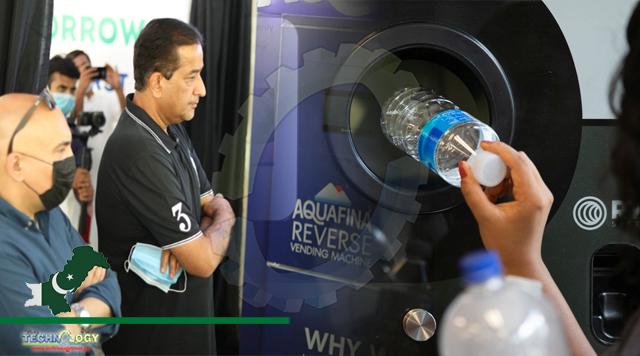Prime Minister’s Special Assistant on Climate Change Malik Amin Aslam on Saturday unveiled the first of its kind reverse vending machine (RVM) for plastics at the Jinnah Super Market, Islamabad.

The machine makes it convenient for people to recycle on the go. Plastic bottles of any brand can be used in the machine.
The RVM itself is like a vending machine in reverse. Consumers just have to press the start button on a touch screen and the RVM will open up a slot to receive the plastic bottle. Once deposited, the RVM compresses the bottle so that it is ready for the next steps of recycling.
The RVM is part of the government’s strategy and intent to take meaningful steps towards tackling the issue of plastic waste and fixed by a company PepsiCo.
Earlier this year, the company announced the country’s largest plastics collection and recycling project under the Prime Minister’s Clean Green Pakistan programme.
Later, the firm announced more than doubling its existing targets for plastic collection and recycling. It will scale up its existing 4,750 tons plastics collection programme by adding another 5,500 tons making a total of 10,250 tons of plastics to be collected and recycled in 2021.
Mr Aslam said: “All of us will have to work together to truly address the plastic issue. The RVM machine is a way of making that connection with the public and encouraging them to recycle.”
Ecosystem degradation threatens water, food security
Experts at a webinar said the provincial and federal governments have failed to protect habitats despite all policies, action plans and allocation of funds. The core reasons for the degradation of ecosystems they cited were the unchecked deforestation, use of land change and overexploitation of natural resources, including subsurface water.
Aquifers are depleting causing a severe threat to water security as we have already reached below the required water per capita, they said.
The webinar on “Ecosystem restoration for water and food security for all” was organised by Development Communications Network (Devcom-Pakistan).
The panel of experts included EvK2CNR senior scientist and technical advisor Ashiq Ahmed Khan, former Planning Commission chief for water sector and chair Development Finance Naseer Gillani and water security expert Dr Zainab Ahmad.
Climate expert Munir Ahmed said: “Pakistan’s all eleven ecosystems are under severe threats because of the negligence and inefficient management by the governments. There is no sufficient check on deforestation that has declined to much less than two per cent. The 10 billion tree tsunami project is focusing more on planting saplings while timber and housing mafias are free to change the land-use and chop trees.”
Naseer Gillani said food security has not been allocated specific investment with respect to restoration of ecosystems. On the other hand, immense change of land-use is taking place unnoticed.
Groundwater management is totally missing while 39 canal commands are withdrawing more water than recharge hence water table is lowering reducing the storage and increasing the cost of pumping out.
He said soil salinity is on increase due to less availability of canal water. The construction of Mohmand Dam will bring a insignificant increase in irrigated agriculture by 17,000 acres at an official cost of Rs304 billion that practically would rise up to minimum Rs750 billion.
Dr Zainab Ahmed said: “Water is integrally significant for communities and states. But a country like Pakistan with around 207 million people where 90pc of water utilisation is for agriculture, which eventually contributes 20pc to GDP, water security remains the impending issue.
“Water availability in Pakistan is dependent on a single Indus River system, which also is the source of maintaining ground water level.”
Per capita water availability was 5,650 cubic metres in 1951 which has reduced to 908 cubic metres in 2021. This availability may soon fall to 860 cubic meters and if effective strategy is not followed it may fall up to 500 cubic metres by 2040.
Currently, Pakistan is on 23rd number among 167 water scarce countries and among top 10 being affected by climate change.
Originally published at Dawn